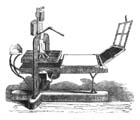The Ogden Manuscripts,
University College, London
There are four books of letters in the Ogden MSS collection at University College in London: Ogden MSS 73 (1), 73 (2), 73 (3), and 74. Most of the letters are of only marginal interest, containing very topical, mundane matter for which the context is long since forgotten. There are, however, a few notable exceptions.
For instance, the collection has two letters from John Venning, dated 1811 and 1812 (sparse years for the Hone biographer). Venning was an acquaintance of Hone's from as early as 1798, when, in an effort to disentangle his son from his associations with the London Corresponding Society, the elder William Hone found his son a position in Chatham, some thirty miles east of London. The very presence of the letters, particularly given their familiar tone, suggests that Hone maintained this early friendship with a man whose political thinking differed greatly from his own.
Also, the Ogden collection offers letters from Alexander Galloway, dated 1817 (while Hone was in prison on libel charges and also in touch with Major Cartwright, a veteran reformer), 1818, and 1821. The letters are important partly because of Galloway's history: he was a high-level operative in the London Corresponding Society in the later 1790s, and he spent the first two years of the nineteenth century in prison with Hone's early business partner, John Bone. Clearly, Hone retained his connections with this radical from the earlier period of political discontent, a fact which helps support the notion (forwarded by historian Iain McCalman and others) that the post-Waterloo social unrest was more directly tied to the earlier upheaval than has usually been acknowledged. What is more, Galloway's second letter in the collection offers one of the few hints we have of the character of Sarah Hone:
"We shall be glad to see you and Mrs. H and I will pay her a compliment that I do not shew to many ladies, at my own house, that is by taking a cup of tea with her, because her worth and firmness demand this respect from all those who have had an opportunity of appreciating in its proper character her high merit." (Galloway to Hone, 27 Feb. 1818, Ogden MS 74, 22)
The collection also contains several telling letters from John Childs (including several describing the Church Rates controversy of 1837 in which Childs played so great a part), and this rather touching note from the eminent antiquarian, Joseph Parkes, written while Hone was in the midst of his very public battle with the Quarterly Review in 1823-24:
"Let me exhort you my dear Friend for your character's sake and your Family to wind up and begin de novo if you doubt your power of struggling against the tide. Your friends will be far more willing and able to serve you then. Do not stagger under a pressure you cannot bear: Your character and your energies will rise from beneath the ruins superior and invigorated. No transaction of your life I will venture to say has blighted the disinteredness [sic] and sincerity of your heart--What then? What can overcome you but your own want of courage? Cast away from you any false pride, and submit to a few months of necessary mortification for future comfort--for none have you known to my perception these three years. Think of De Foe, Old Chaplain Johnson, and a cloud of Witnesses to the Truth of Liberty, and do not bend under pressure. What greater triumph could your enemies have than the suicide of your Mind. Your body I care not for, that is clay and weakness--but lift your mind above these trials: I shall still see you a happy man, and independent." (Parkes to Hone, 24 Feb. 1823, Ogden MS 74, 29)
One other highlight from the Ogden collection deserves mention here. In 1876 James Routledge published his Chapters in the History of Popular Progress Chiefly in Relation to the Freedom of the Press and Trial by Jury, one of the first historical volumes to celebrate the influence of Hone's 1817 trials on the rise of a free press in England. The archive makes it clear that Routledge borrowed some source materials from Alfred Hone (William Hone's eldest son) in order to prepare the volume. About William Hone and about his own book Routledge claims, "his every word is honest and I think some parts of your [Alfred's] father's life will be seen as they have not been seen before" (Ogden MS 73.2, 6a).
On the whole the Ogden MSS offer a useful cache of materials, particularly
for the study of Hone's relationships with other printers and publishers.
One frustrating shortcoming of the collection: several letters--including
one from Hone's father's influential clergyman William Huntington S. S.
and at least one from John Childs--are listed as part of the collection
but have apparently been lost.
